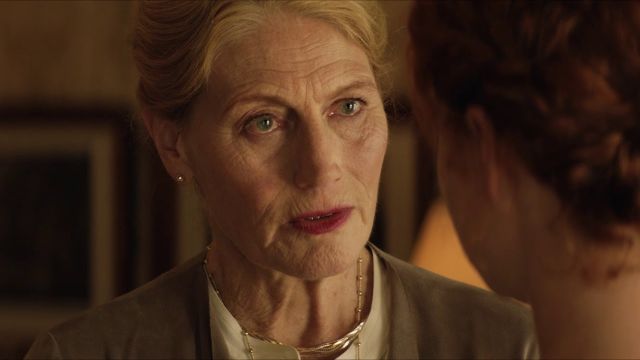Beast review - mesmerising and murky in equal measure
Two compelling leads navigate a labyrinthine plot
Two fast-rising actors, Jessie Buckley and Johnny Flynn, lend genuine flair to a thriller that needs its mesmerising star turns to rise above the murk. Densely plotted, if sometimes suffocatingly so, TV director Michael Pearce's feature film debut keeps you guessing on matters of culpability right through to the closing exchange. But one can't help but feel in places that less would be more, however pleased one is to clock the continued career ascent of its leading players.
The near-ubiquitous Buckley plays the novelistically-named Moll, who has a job as a tour guide that she loathes and a mum, Hilary (Geraldine James, pictured below), who doesn't exactly offer much by way of succour. First glimpsed at a choir rehearsal presided over by the (literally) barking Hilary, Moll is shadowed by traumatic events from her past and is about to fall under the sway of a shadowy figure very much from her present. That, in turn, would be the rifle-toting Pascal (Flynn), an apparently sensitive soul whose own feelings of maternal abandoment surely help to propel him into Moll's arms. While Moll's family (two none-too-accommodating siblings included) fret and cluck and condescend in her direction, she drifts towards the drifter that is Pascal. Are the newfound lovers in fact Janus-faced sides of the same damaged coin, or might one have something curative to offer the other?
While Moll's family (two none-too-accommodating siblings included) fret and cluck and condescend in her direction, she drifts towards the drifter that is Pascal. Are the newfound lovers in fact Janus-faced sides of the same damaged coin, or might one have something curative to offer the other?
Pearce's probing camera forsakes the theatrics promised by his film's title to concentrate on the Jamesian beast that exists within us all. Murderous goings-on are seen meanwhile to be overtaking the island of Jersey, the film's unusual setting, and may implicate Pascal, or not. The soundscape at times goes into overdrive, and clouds are put to both metaphoric as well as literal use, but not before Pascal remarks of the couple, "We're the same". Which, in context, may not be quite what Moll needs to hear.
Arguably in undue thrall to its own ambiguity, Beast feels like it isn't entirely sure just how arty or atmospheric it wants to be. Buckley, interestingly, can adjust her face into the sort of purposeful lockdown that will surely serve her well if she wants to go the action heroine route, while Flynn long ago proved himself a dab hand at "sensitive souls" who may be hiding a less beneficent side. (His breakout stage performance in Martin McDonagh's Hangmen kept you shifting perspectives by the second.) The film ends with an encounter that challenges the audience to make of it what they will, but when it comes to the charisma evidenced by its sterling cast, on that topic there can be no doubt.
- Read more film reviews on theartsdesk
- Overleaf: watch the trailer for Beast

 That silver sovereign isn’t just a useful way of keeping the production fresh and the cast on its toes. It’s also a metaphor for Schiller’s treatment of these two remarkable figures from history. Despite their obvious differences – Catholic/Protestant, four-times-married/virgin queen – the play reveals them to be two sides of the same coin.
That silver sovereign isn’t just a useful way of keeping the production fresh and the cast on its toes. It’s also a metaphor for Schiller’s treatment of these two remarkable figures from history. Despite their obvious differences – Catholic/Protestant, four-times-married/virgin queen – the play reveals them to be two sides of the same coin. Elsewhere, too, Icke finds contemporary resonance in spades. Just because a thing is popular, does that make it right? This is the crux of Elizabeth’s dilemma. The duplicity and back-stabbing among Elizabeth’s courtiers are pretty familiar too. Icke has one of them describe another’s actions as “flip-flopping” to drive home the point.
Elsewhere, too, Icke finds contemporary resonance in spades. Just because a thing is popular, does that make it right? This is the crux of Elizabeth’s dilemma. The duplicity and back-stabbing among Elizabeth’s courtiers are pretty familiar too. Icke has one of them describe another’s actions as “flip-flopping” to drive home the point.